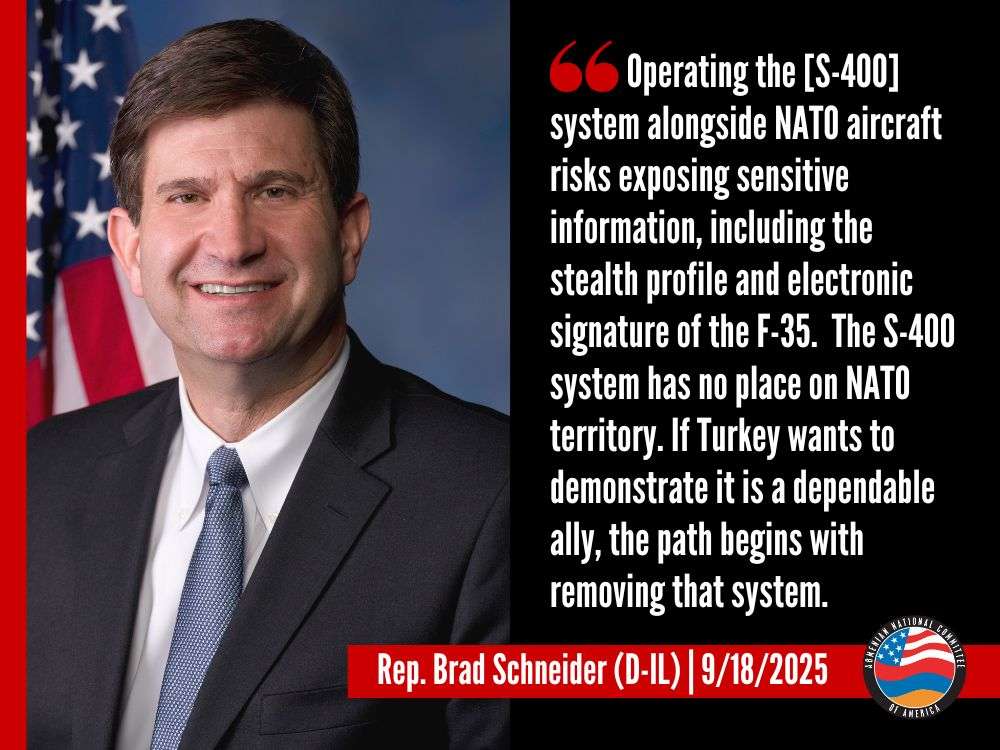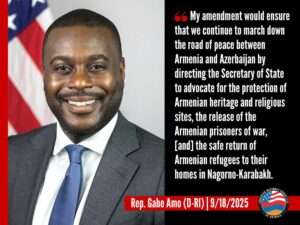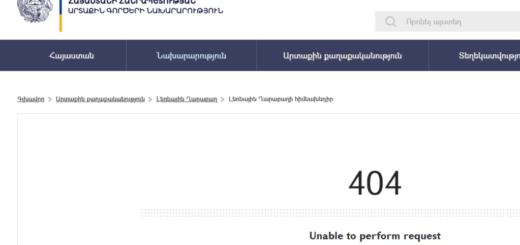House Foreign Affairs Committee Calls for Release of Armenian Prisoners, Return of Artsakh’s Armenians

— Representatives Amo, Sherman, and Titus Lead Efforts to Demand Accountability for Azerbaijan and Turkey’s Regional AggressionWASHINGTON, DC – The House Foreign Affairs Committee today adopted Armenian National Committee of America (ANCA) backed amendments to the Fiscal Year 2026 State Department Authorization Bill (H.R.5300), directing the State Department to secure the release of Armenian prisoners of war, safeguard Armenian religious and cultural heritage, and support the right of return for the forcibly displaced Armenians of Artsakh. In a further step forward for accountability, the Committee also passed an amendment calling for a comprehensive report on Turkey’s regional destabilization.
“Despite all the stakeholders trying to erase Artsakh, forsake hostages, and abandon our holy sites, the U.S. House Foreign Affairs Committee – on a bipartisan basis – took a strong stand today for the return of Armenians to Artsakh, the release of Armenian hostages, and the protection of our Christian holy sites,” said ANCA Executive Director Aram Hamparian. “We will continue to fight efforts to normalize genocide – to legitimize ethnic cleansing – because doing so only invites more genocide, further ethnic cleansing.”
Rep. Gabe Amo (D-RI), whose amendment passed with bipartisan support in an en bloc package, highlighted the urgent issues left unaddressed by the so-called peace agreement between Armenia and Azerbaijan. “Armenian religious and historic sites continue to be destroyed. Armenian prisoners of war are still held in Azerbaijan. And more than 120,000 Armenian refugees still cannot safely return to their homes in Nagorno-Karabakh,” stated Rep. Amo during debate. He added, “My amendment would ensure that we continue to march down the road of peace between Armenia and Azerbaijan by directing the Secretary of State to advocate for the protection of Armenian heritage and religious sites, the release of the Armenian prisoners of war, [and] the safe return of Armenian refugees to their homes in Nagorno-Karabakh.”The Committee also debated two pro-Armenian amendments offered by Congressional Armenian Caucus Co-Chair Rep. Brad Sherman (D-CA). His first proposal, Amendment #97, would have repealed the presidential waiver authority of Section 907 of the FREEDOM Support Act, restoring Congress’s prohibition on U.S. military aid to Azerbaijan. “Section 907 was waived by administration after administration, no matter what the Azerbaijani dictatorship did. And, it’s time for Congress to recognize that,” Rep. Sherman stated. He went on to note, “we’ve seen an ethnic cleansing, a cultural genocide, and now, the destruction of the churches while hostages are still being held. I urge my colleagues to vote for this amendment.” Although the amendment was narrowly defeated by a 26 to 24 vote, it received unprecedented unanimous support from committee Democrats. Republican Reps. Michael Lawler (R-NY) and Chris Smith (R-NJ), broke with Republican party-line opposition to the amendment, maintaining their longstanding commitment to enforcing prohibitions on U.S. military assistance to Azerbaijan.Rep. Sherman’s second amendment would have prohibited the U.S. International Development Finance Corporation from funding projects in Turkey until it lifts its blockade of Armenia, and in Azerbaijan until all Armenian prisoners are released. “We should not be developing the economy of Turkey until it ends its blockade of Armenia. We should not be developing the economy of Azerbaijan until it releases all Armenian prisoners of war from a war that’s over,” Sherman argued. Though the measure did not pass, Republican Representatives Michael Lawler and Keith Self (R-TX), House Foreign Affairs Subcommittee Chairs for Middle East and Europe, respectively, publicly acknowledged the need for the Administration to take action on these concerns.The Committee also approved an amendment introduced by Rep. Dina Titus (D-NV) requiring the State Department to submit a detailed report on Turkey’s continued deployment of Russian S-400 missile systems. Speaking in support of the measure, Rep. Brad Schneider (D-IL) underscored the risks posed by Ankara’s decision to operate Russian air defenses within NATO. “Operating the system alongside NATO aircraft risks exposing sensitive information, including the stealth profile and electronic signature of the F-35. The S-400 system has no place on NATO territory. If Turkey wants to demonstrate it is a dependable ally, the path begins with removing that system,” stated Rep. Schneider.








